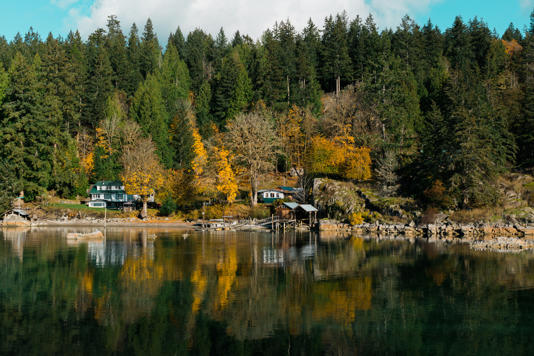
A small island in B.C. has taken a radical step towards supporting affordable housing: it’s started taxing short-term rentals.
With a population of approximately 1,200, it seems unfathomable that Cortes Island, a 130-square-kilometre piece of land along the coast of B.C., could be struggling with a housing affordability crisis. But a recent survey found that 159 residents were living in unstable housing situations—either unsheltered or living in temporary or emergency accommodations. And a 2022 housing report found that the average listing price on the island was $794,600, yet most residents could only afford a $200,000 home.
A thriving short-term rental market on the island, driven by tourism, is contributing to the inflated housing prices. There are approximately 100 short-term rentals on Cortes and 94 per cent of those are listed as entire dwellings, according to Mark Vonesch, the Strathcona Regional District director for the island. “We’re a population of 1,200 people, so that’s pretty significant,” he says.
To help make housing more affordable, the regional government implemented a three per cent municipal and regional district tax on short-term rentals. The tax, which is regulated by the provincial government and available to all municipalities in B.C., has been in place since July 1.
What makes Cortes’ new tax so unique is that it’s the first region in B.C. to use the tax to build affordable housing. “All of the funds go directly to the Cortes Housing Society,” Vonesch says.
Booking platforms, such as Airbnb and Vrbo, collect the three per cent tax from guests staying in short-term rentals on the island. That money’s then passed to the provincial government which transfers it to the Strathcona Regional District and onto the Cortes Housing Society.
“Speaking to short-term rental operators, people are glad that the tourists are able to contribute,” Vonesch says. “And the tourists that I’ve spoken to are very happy to be able to contribute. So, unlike some other taxes, it seems like it’s really a win-win-win for our community and for our housing crisis.”
Depending on the accommodation, the tax typically works out to an extra $5 or $6 per night. And it’s estimated to raise between $30,000 to $50,000 per year for affordable housing—not enough to solve the problem, but at least it will give the project a boost.
The Cortes Housing Society is using the funds to build Rainbow Ridge, an affordable housing development. The development will include 24 townhouse units. The units are only for rent, not to buy, and will be operated by the housing society. Sixteen of the units will be rented out at below-market value. There’s an application process to qualify for one of these rentals that will look at an individual’s needs and income level. There are currently 175 people on the waiting list for these units, Vonesch says.
The other eight units will be rented out at market price, with the goal of housing essential personnel, such as nurses and doctors.
While this won’t reduce the number of short-term rentals on the island, Vonesch says that isn’t necessarily the goal.
“We’ve got a lot of tourism here. It’s kind of one of our biggest industries,” he says. “So, it is a tricky balance. There’s lots of people in Cortes that live on their property, and then they have a cabin or another house that they rent out. And that’s what allows them to live here. I certainly don’t want to ban that, but I do want to look at smart regulation.”
Source: Cottage Life
